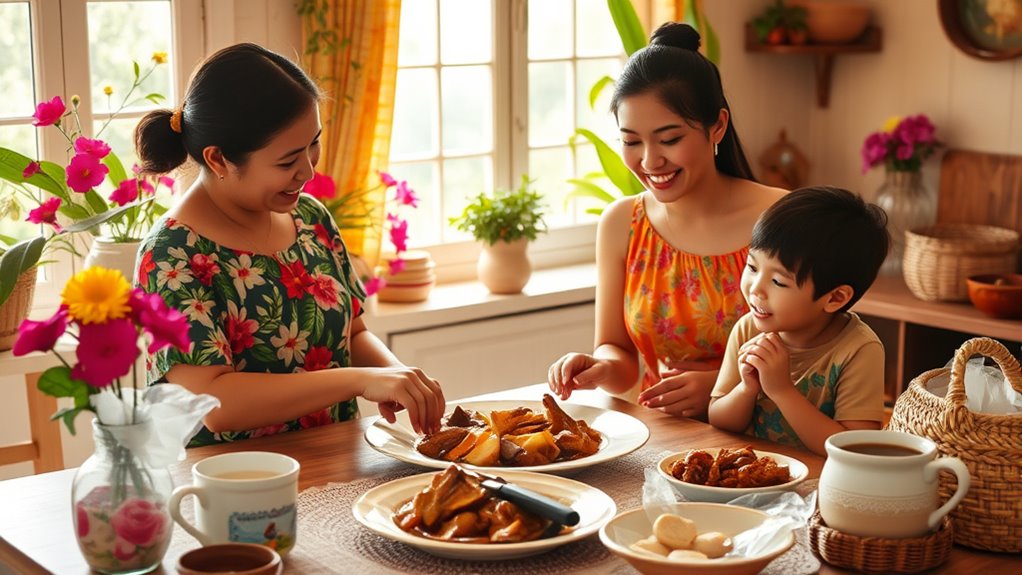To understand a Filipina’s love language, embrace her cultural background. Verbal affirmations like “Mahal kita” hold deep meaning, while acts of service, like helping with chores, show your care. Quality time is essential, so make the moments you spend together count. Physical touch, or “haplos,” conveys affection, but remember to respect her boundaries. Gift-giving reflects thoughtfulness and respect. Discovering these nuances can enhance your connection, and you might find even more insights ahead.
Key Takeaways
- Pay attention to verbal affirmations; simple phrases like “Mahal kita” can hold deep meaning in expressing love.
- Observe acts of service; everyday tasks done with care indicate love and commitment in Filipino culture.
- Prioritize quality time; engaging in shared activities fosters emotional connections and strengthens relationships.
- Recognize the significance of physical touch; gestures like a gentle hug or a pat convey affection and intimacy.
- Understand the importance of gift-giving; thoughtful gifts presented respectfully show generosity and consideration in a relationship.
The Importance of Cultural Context in Love Languages

Understanding the cultural context of love languages is essential, especially in a diverse society like the Philippines, where traditions and modern expressions intertwine.
You’ll find that Filipino culture showcases an array of love languages influenced by its rich tapestry of over 170 languages. This diversity enhances emotional expression, allowing you to connect deeply with different regional variations.
In conservative settings, verbal affirmations like “Mahal kita” hold significant weight, while subtle hints, or “Parinig,” add layers to communication.
Recognizing these nuances is vital, as they shape how love is conveyed and interpreted. By embracing these cultural aspects, you’ll foster meaningful relationships that respect and honor the unique ways love is expressed in Filipino culture.
Exploring Acts of Service as a Love Language

Acts of service serve as a powerful love language that emphasizes tangible actions over words. When you express love through acts of service, you make your partner’s life easier with everyday tasks like cooking meals, doing laundry, or running errands.
It’s not just the actions themselves; it’s the intentionality behind them. You should aim to meet your partner’s needs without waiting for requests, demonstrating reliability and consistency.
In Filipino culture, these small gestures reflect deep care and commitment, showcasing values of effort and sacrifice. Recognizing acts of service can strengthen emotional bonds, making both of you feel valued.
The Power of Words of Affirmation

While acts of service show love through tangible actions, words of affirmation create emotional connections that deepen your relationship. By expressing love verbally, you can uplift and validate your Filipina partner’s feelings. Trust issues can often arise in relationships when communication is lacking, making affirmations even more crucial. Moreover, understanding the importance of clear communication can significantly enhance your relationship dynamics. A father’s unconditional love can serve as a powerful example of how to express affection meaningfully.
Incorporating mindfulness techniques into your conversations can also enhance emotional intimacy and understanding.
Simple compliments, words of encouragement, or even a heartfelt “thank you” can make her feel cherished. When you share positive affirmations, you strengthen your bond and foster trust.
On the flip side, hurtful words can damage that connection, so be mindful of your language. Consistently acknowledging her efforts and achievements not only fulfills her emotional needs but also encourages positive behavior.
Tailor your affirmations to her preferences, ensuring they’re sincere and genuine. This practice nurtures a culture of appreciation that enriches your relationship. Additionally, developing communication skills can further enhance your ability to express affection effectively, leading to a more fulfilling partnership.
Quality Time: Building Stronger Connections

Quality time serves as the heartbeat of any strong relationship, especially in Filipino culture. When you prioritize spending quality moments together, you show genuine love and investment in your partner. Engaging in shared activities, like family gatherings or community events, enhances your bond and deepens your emotional connection. Remember, it’s not just about being physically present; it’s about being truly engaged and attentive. Regularly carving out time for each other helps maintain those essential emotional ties. Whether it’s sharing a meal, enjoying a movie, or simply exchanging stories, these moments foster mutual support and understanding. Additionally, emotional resilience can be strengthened through these shared experiences, helping both partners cope with life’s challenges together. Incorporating mindfulness practices during these interactions can further enhance the quality of your time spent together. Moreover, understanding the importance of preventive care in your relationship can lead to a healthier and more fulfilling partnership. Embracing sustainable living together can also create meaningful experiences that contribute to your shared values and goals. Furthermore, participating in community events can provide opportunities for social connections and support, enriching your relationship even more.
Understanding Physical Touch in Filipino Culture

Building on the importance of quality time, physical touch plays an essential role in expressing affection within Filipino culture. Known as “haplos,” this form of communication includes gestures like a kiss on the cheek or a stroke on the back.
In private settings, these expressions of love thrive, even though public displays of affection remain limited. Physical touch conveys care without words, making it significant in relationships.
While often welcomed, it’s essential to seek consent, reflecting the culture’s values of modesty. Signs of affection, like hand-holding, strengthen bonds among friends and family.
The Role of Gift-Giving in Relationships

Gift-giving plays a pivotal role in nurturing relationships within Filipino culture, as it embodies thoughtfulness and generosity. When you give a gift, it’s not about the price; it’s the sentiment that counts. Filipinos appreciate the effort you put into selecting something meaningful.
Presenting your gift with both hands shows respect, highlighting the cultural significance of this act. You’ll find that gifts are often exchanged during celebrations, from birthdays to Christmas, reinforcing social bonds.
Remember, it’s customary to reciprocate gifts, maintaining harmony in relationships. Modesty prevails; recipients may wait to open gifts privately, reflecting gratitude.
Ultimately, thoughtful gifts enhance emotional connections, showcasing your care and understanding, fostering intimacy, and strengthening the bond you share.
Consistency and Emotional Support in Love Languages

While emotional support is essential in any relationship, consistency in how you provide it can truly strengthen your bond. Regularly showing emotional support fosters trust and reliability, creating a safe space for both of you.
Tailoring your support to her needs enhances its effectiveness, whether through acts of service, physical touch, or words of affirmation. Active listening plays a significant role, as it validates her feelings and encourages deeper sharing.
In times of crisis, being patient and understanding is imperative; recognizing her coping mechanisms can make a substantial difference.
Frequently Asked Questions
How Can I Identify My Filipina Partner’s Primary Love Language?
To identify your partner’s primary love language, start by having open discussions about feelings and preferences.
Pay attention to how she expresses affection towards others and her reactions to different forms of love, like compliments or acts of service.
Engage in intimate conversations to strengthen your connection, and observe her responses to physical closeness and quality time.
These insights can help you understand her emotional needs and enhance your relationship.
What Cultural Misconceptions Should I Avoid When Expressing Love?
Did you know that 60% of Filipinos believe actions speak louder than words when it comes to love? To avoid cultural misconceptions while expressing love, focus on actions rather than just verbal affirmations.
Understand that subtle gestures, like cooking meals or showing concern, hold significant meaning. Also, remember the importance of family; seeking their approval can strengthen your bond.
Finally, don’t misinterpret “tampo” as mere silence; it’s a nuanced way of expressing feelings.
How Do I Respond if My Partner Prefers a Different Love Language?
When your partner prefers a different love language, start by openly communicating about your feelings.
Ask them what makes them feel loved and share your own preferences.
Be willing to adapt and incorporate their love language into your interactions.
Show empathy and understanding, and don’t hesitate to ask for feedback.
Consistent efforts to express love in their preferred way can strengthen your bond and lead to a more harmonious relationship.
Are There Specific Phrases in Filipino Culture That Express Love?
Imagine love wrapped in words, like a warm blanket on a chilly night.
In Filipino culture, phrases like “Mahal kita” (I love you) and “Aalagaan kita” (I’ll take care of you) express deep affection.
“Sa piling mo, kumpleto ako” (With you, I’m complete) highlights emotional connection, while “Ikaw ang dahilan ng kabog ng puso ko” (You are the reason my heart beats) shows devotion.
Each phrase carries a unique significance, enriching relationships.
How Can I Incorporate Filipino Traditions Into My Relationship?
To incorporate Filipino traditions into your relationship, start by embracing cultural practices like Harana, where you serenade your partner.
Write heartfelt love letters to express your feelings, and engage in acts of service to show commitment.
Attend family gatherings and local fiestas together to strengthen bonds.
Learn some Filipino phrases and enjoy traditional cuisine together.
Celebrating milestones with family involvement and thoughtful gifts will deepen your connection and honor her heritage.
Conclusion
Understanding a Filipina’s love language can deepen your connection and strengthen your relationship. Remember, 70% of Filipinos believe that expressing love through actions, like acts of service, speaks louder than words. By recognizing the significance of each love language—whether it’s through quality time, words of affirmation, or thoughtful gifts—you’ll create a more meaningful bond. Embrace these cultural nuances, and you’ll find that love truly knows no boundaries.









